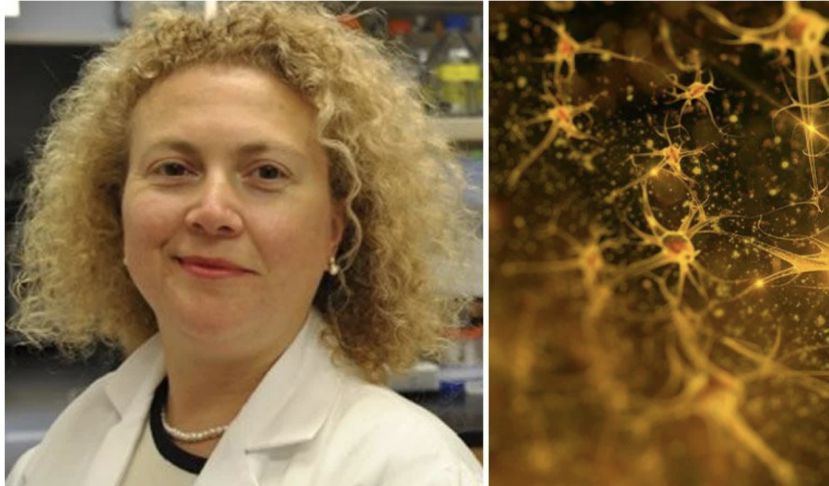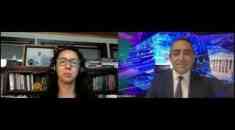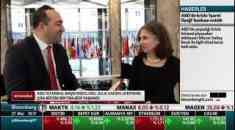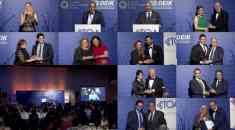A Success Story in the U.S : Dr. Hande Özdinler
Associate Prof. Hande Özdinler, Head of the ALS Research Center at Northwestern University, has become one of the ten best scientific inventors. In a special interview with Journalist Ali Cinar for Turk of America magazine, Dr. Özdinler stated that she started this work for her brother, whom she lost to a cerebral hemorrhage.
-Can you talk about your academic projects?
Özdinler Laboratory was established at Northwestern University in 2009 as the first laboratory in the world to study upper motor neurons. Since then, we have been investigating why these neurons are present in the brain and why they show degeneration.
We are gradually solving the death mechanisms and trying to develop appropriate treatment methods.
Our first project focuses on developing medication. We have presented our great invention together with Dr. Silverman; this is promising for patients with motor neuron diseases and especially for ALS patients, as it will be able to heal the motor neurons in the brain. NU-9 can stop motor neuron deaths more effectively than any other approved medication, and this ability resolves four different mechanisms simultaneously. Thanks to this study, our first steps have given rise to a significant advancement in cell-based and mechanism-focused medication development. We are now in the process of presenting this to patients. It is a challenging, costly, and elaborate process. We need financial support and are spending much time looking for that support.
Our second project is about finding biomarkers. With this study, we will be able to pave the way for drug inventions; we will find out which patient requires which drug, and ultimately, we will ensure the recovery of more patients.
Our third project concerns gene therapy. In this project, we will provide direct gene therapy to motor neurons that have died in the brain, enabling them to reap the benefits of personalized medicine and develop personalized healing methods.
We are working on these three main issues.
-What are the pros and cons of being a Turkish academic in the USA?
Scientists in other countries receive much support from their homelands. Joint projects, investments, student exchange programs, and many brilliant projects. Unfortunately, Türkiye does not benefit enough from scientists who have been successful abroad. In the US, it does not matter where you are from or which nationality you have. It can be challenging to become a C-Level executive. However, this can be achieved with an external and reliable support system. Sadly, I do not have such support. Türkiye does not support me. In addition, nobody from Türkiye has given me much help yet. We always receive the required financial support for our work from NIH project funds.
I would not say that being a Turkish academic in the US has many advantages; nevertheless, being an academic here has its benefits regardless of nationality. Doing science, thinking freely, and immediately accessing technological innovations are ensured. In this atmosphere, your race does not have any importance, and we are mainly discussing the projects.
-Can you mention the awards you have received?
First, I received the Best Master's Thesis Award from Bogazici University. At that time, we were doing the first gene cloning studies in Türkiye. Before a PCR machine, we were cloning genes; those were exciting days. Staying up all night in the lab, I was even once in the laboratory for a whole week without going outside. This was how I finished my thesis.
When I was doing my Ph.D., I received the FASEB award, a science award for the poster I submitted. As a post-associate professor, I received the Harvard Center for Neurodegeneration and Repair (HCNR) Award, which was given to two people at Harvard. This was such a difficult one to get, and I became a Harvard Fellow thanks to this; they also provided funds to the lab I was working in for my training.
At Northwestern, I received the NUCATS Translational Innovation and Corner Innovation awards. These prestigious awards are given to individuals who can think outside the box, create new things no one has ever done, and find innovative methods or solutions.
Our goal has never been to receive prizes and awards but to invent. When we receive awards, we just think, "Well, there are people who follow and appreciate our studies."
- What is your advice to young Turkish people?
It's tough to be young in Türkiye these days. They live in a more difficult time than we did. Universities are especially under so much pressure. Boğaziçi University is one of the best examples of this. Conscious, hardworking, productive, brilliant young people should be appreciated and given value. They are the ones who make inventions, ensure development and make the world a better place. Despite all the challenges they are faced with, young people must be resilient and continue to improve themselves. During COVID-19, many good universities moved their classes online and made them publicly accessible. I advise young people to learn and improve continuously. They will eventually see rewards for their efforts, maybe not today, but tomorrow for sure. They should work with a view to the future and invest in themselves.
-What is your goal for the next five years?
I want to see our work pay off in 5 years, and I want to see ALS patients starting to get better. We will finish this fight with ALS, and I would love to celebrate on the day this ends. We should declare that day a holiday for all ALS friends, their children, mothers, and fathers. A festival of the victory of humanity.
And I also would like to open an exhibition for my paintings. I want to sell my images to support students during their studies, and I would like to write, publish books, see the countries I haven't been to and have a fantastic time with my dear friends.
Latest from Ali Cinar
- Merve Hickok, President of the Center for AI and Digital Policy, speaks on the latest developments in AI.
- Bloomberg HT U.S. Representative Ali Cinar interviews Julie Ediah, U.S. Consul General of Istanbul
- Integrated Polymer Industries Recognized by Northrop Grumman for Supplier Excellence
- Cuts to Social Work and Education Budgets in New York
- President Biden meets with Texas governor, officials in 1st visit to US-Mexico border










